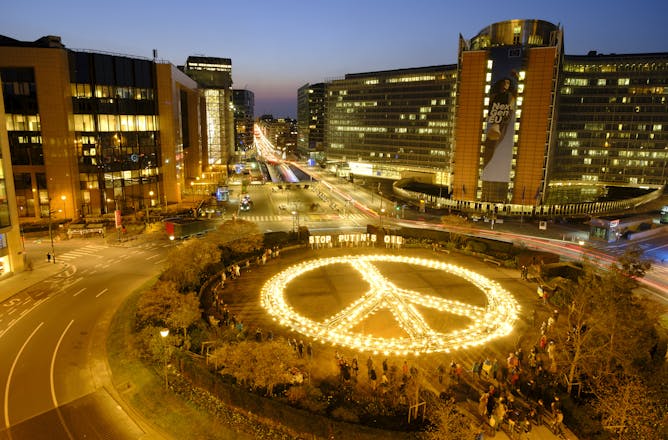|
When I first spoke with peacebuilding and conflict resolution scholar Andrew Blum at the end of March, we discussed writing about how peace talks work. Ukraine and Russia had been holding peace negotiations, and it seemed reasonable to think they might hatch a deal to end the war.
Since then, the violence has only worsened and grown uglier, amid reports of Russian soldiers raping women and systematically murdering civilians. Currently, the prospect of peace seems very far away.
But understanding how peace talks work – and why they fail – remains useful when thinking about why the two countries are still fighting, and what it might take to end the war.
We asked Blum five key questions to help explain peace talks.
“Negotiators must sit across from those they believe have killed their sons and daughters," Blum writes. "This means that there must be compelling, strategic reasons to negotiate.”
Also today:
|

|
Amy Lieberman
Politics + Society Editor
|
|

Peace activists demonstrate outside the European Commission building on March 22, 2022, in Brussels.
Thierry Monasse/Getty Images
Andrew Blum, University of San Diego
Russia and Ukraine have held several rounds of failed peace talks. Understanding the challenges to successful peace talks helps illuminate the struggle for peace in Eastern Europe.
|
Ethics + Religion
|
-
Tok Thompson, USC Dornsife College of Letters, Arts and Sciences
A folklorist explains the prehistoric origins of the mythical Easter Bunny and why this longstanding cultural symbol keeps returning each spring.
-
Simranjit Khalsa, University of Memphis
Originally a spring harvest festival, Baisakhi acquired religious significance after the10th Sikh guru created the Khalsa, a distinctive Sikh identity, on this day.
|
|
Arts + Culture
|
-
Peter Dreier, Occidental College
Years before Colin Kaepernick was born, Robinson wrote, ‘I cannot stand and sing the anthem. I cannot salute the flag; I know that I am a Black man in a white world.’
|
|
Economy + Business
|
-
Dionne A Nickerson, Indiana University
Research regarding corporate social responsibility actions detected a pattern in terms of the benefits for brands.
|
|
Politics + Society
|
-
Ayesha Jalal, Tufts University
The former prime minister was forced from office by a vote of no confidence. But that doesn’t mean the political drama is over, an expert on Pakistani politics explains.
-
Thomas J. Hrach, University of Memphis
The more deaths there were, the more news reports used the perpetrator’s name. But something changed in 2012. The Brooklyn subway shooting may be an exception.
|
|
Health + Medicine
|
-
Andrew Williams, Albert Einstein College of Medicine
Although Medicare has agreed to pay for Aduhelm, its coverage comes with restrictions.
|
|
Environment + Energy
|
-
Nicholas P. Sullivan, Tufts University
One of the oldest industries, fishing, is entering the world of advanced analytics and data-driven planning. With oceans under stress and key fish stocks dwindling, can precision fishing help?
|
|
Education
|
-
Elizabeth K. Anthony, Arizona State University
School districts across the nation are wrestling with whether to have police officers on school grounds.
|
|
Science + Technology
|
-
John Conway, University of California, Davis
A decadelong experiment produced the most accurate measurement yet of the mass of W bosons. These particles are responsible for the weak force, and the result is more evidence for undiscovered physics.
|
|
|
|
Today's graphic |
|---|
| | More from The Conversation US |
|---|
| |
|
| |
| |
| |
| |
|
|